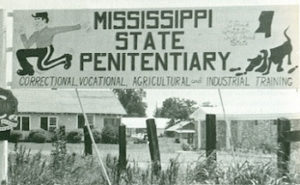
*Parchman Farm State Prison is briefly written about on this date. It was opened in 1901 as a maximum-security prison farm located in unincorporated Sunflower County, Mississippi, in the Mississippi Delta region.
Since its construction, Parchman Farm has been part of many American Civil Rights movement episodes. Officially known as the Mississippi State Penitentiary (MSP), it is the only maximum-security prison for men in Mississippi and is the state's oldest prison. Parchman Farm began with four stockades and was constructed largely by state prisoners. It has beds for 4,840 inmates. Inmates work on the prison farm and in manufacturing workshops.
In the spring of 1961, Freedom Riders went to the American South to work for the desegregation of public facilities serving interstate transportation, as segregation of such facilities and buses had been declared unconstitutional. The federal government had done nothing to enforce the Supreme Court decisions, and southern states ignored the rulings. Violence had overwhelmed the Riders in Alabama, and the federal government intervened. Finally, the governors of Alabama and Mississippi agreed to protect the riders in exchange for being allowed to arrest them. The Governor of Mississippi, Ross Barnett, did not permit violence against the protesters but arrested the riders when they reached Jackson, Mississippi. By the end of June, 163 Freedom Riders had been convicted in Jackson, and many were jailed in Parchman.
On June 15, 1961, the state government sent the first set of Freedom Riders from Hinds County Prison to Parchman; to make the protesters as uncomfortable as possible, they were put to work on chain gangs. The first group sent to the farm were 45 male Freedom Riders, 29 Blacks, and 16 whites. A call went out across the country to keep the Freedom Rides going and "fill the jails" of Mississippi. At one time, 300 Freedom Riders were imprisoned at Parchman Farm. Many Riders struggled in prison in 1961; many others headed South to join the Freedom Rides. Winonah Myers was one and was eventually jailed for her activism. She witnessed the treatment firsthand. She was treated just as the men were, with bad living quarters and worse clothing and meals. Although most Freedom Riders were bailed out after a month, Myers was the last to leave as an activist.
Their experience at Parchman gave the Freedom Riders added credibility in the 20th-century Civil Rights Movement. This correctional facility has created Blues and Folk songs by Booker White and Mose Allison. Parchman Farm holds male offenders classified at all custody levels—A and B custody (minimum and medium security) and C and D custody (maximum security). It also houses the male death row—all male offenders sentenced to death in Mississippi are held in MSP's Unit 29—and the state execution chamber. Parchman Farm occupies about 28 square miles of land.